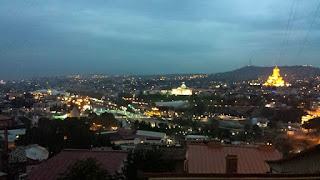The past few days in the United States have undoubtedly been historic. A basic principal of foreign affairs is that the US needs to make sure its affairs are in order before it can go around the world, dictating values or what form of development works. By affirming government action that makes sense, through the Affordable Care Act, and by refusing to relegate LGBT to second class citizens in terms of marriage; the Supreme Court showed that the US retains a privilege to both affirm the ability of government to intervene to improve the lives of others and the economy and that the US is on a constantly forward, albeit at times slow, march towards equal freedoms and protections under the law.
Last week, I was fortunate enough to take part in TEDx Tbilisi. Many of you are familiar with TED as the two cent bits of fast food wisdom, shared by elites and randomly selected accomplished individuals, and then spread like wildfire over Facebook. I enjoy them but I'll be one of the first to admit that they can carry a cloying air in the US.
However, it serves a much more interesting purpose here in Georgia. The actual TED conference is an event along the lines of the Davos World Economic Forum or Clinton Global Initiative - closed to primarily the elite and based on invitation only. This forum is open invitation and curated to have a particular mix of Georgian youth and activists and expats engaged with change-making in Tbilisi and Georgia as a whole.
In the US, we take the open dialogue of ideas for granted. A thousand and one views and more bounce across the internet and our TVs. A public common forum was built over the past few centuries. The rest of the world is far from that privileged.
TEDx served as a day long event for that kind of space. Activists, artists, and academics spoke on a range of issues; both particular to Georgia and relevant to other points in the world. The audience and speakers were cut from a very specific demographic, English speakers with an eye towards the outside world, but there was something to be said for some of the statements that people were making in public.
An eco-activist shared about the overlap of environmental activism, technology, and social engineering in a fashion that sounds advanced compared to American methods. A tech social entrepreneur elaborated on the need for client driven development. The winner of Georgia's Got Talent performed an elaborate dance routine with her wheelchair bound partner. Of note, the closing speaker was a lesbian woman who helps to lead an LGBT rights activist group.
The Georgian Orthodox Church is a powerful institution in the country. Georgia stands as the "second Christian nation" - converting as early as the 4th Century. While the Georgian Constitution recognizes a separation of church and state, it still sees a special role for the Georgian Orthodox Church. Religious devotion is commonly visible.
Also, the church is not accepting, some may say to the point of discriminatory, against LGBT people.
In public, they have been beaten or insulted. There are no legal protections. And this is nothing to say of the terrible struggle that some must go through with their very own family.
 Conditions are not as bad as they are in neighboring Russia or other nations, but the rights of LGBT are far from accepted. Whether its due to the role of the church, a need for society to advance in its understanding, or any number of other causes - its worth recognizing the hard place that many are in, even in forward looking countries such as Georgia.
Conditions are not as bad as they are in neighboring Russia or other nations, but the rights of LGBT are far from accepted. Whether its due to the role of the church, a need for society to advance in its understanding, or any number of other causes - its worth recognizing the hard place that many are in, even in forward looking countries such as Georgia.Events such as the TEDx conference can only contribute to understanding and promote the diversity of sexual orientation into the light. Open dialogue and forums such as this one might have topics that seem basic for Americans but they can represent large steps in other places.
Over the past few days since the Supreme Court's ruling, many Georgian friends have toasted to the legalization of same-sex marriage. People have congratulated me for the better evolution that the US has gone through. While many of them are already the type who look towards the US as a model, there's still something to be said for when our country lives up to the perception.
Even if it takes time.


